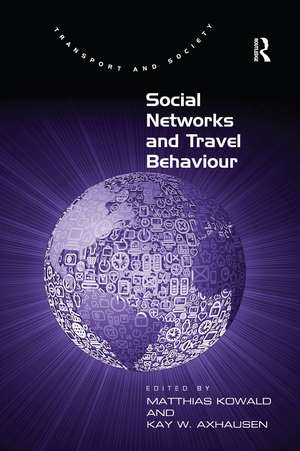Social Networks and Travel Behaviour
Autor Matthias Kowald, Kay W. Axhausenen Limba Engleză Paperback – 30 sep 2020
Preț: 258.09 lei
Preț vechi: 325.50 lei
-21% Nou
Puncte Express: 387
Preț estimativ în valută:
49.40€ • 53.68$ • 41.52£
49.40€ • 53.68$ • 41.52£
Carte tipărită la comandă
Livrare economică 21 aprilie-05 mai
Preluare comenzi: 021 569.72.76
Specificații
ISBN-13: 9780367668839
ISBN-10: 0367668831
Pagini: 222
Dimensiuni: 156 x 234 x 24 mm
Greutate: 0.36 kg
Ediția:1
Editura: Taylor & Francis
Colecția Routledge
Locul publicării:Oxford, United Kingdom
ISBN-10: 0367668831
Pagini: 222
Dimensiuni: 156 x 234 x 24 mm
Greutate: 0.36 kg
Ediția:1
Editura: Taylor & Francis
Colecția Routledge
Locul publicării:Oxford, United Kingdom
Cuprins
Social Networks and Travel Behaviour
Notă biografică
Matthias Kowald works for the Swiss Federal Office for Spatial Development, Berne and Kay W. Axhausen is Professor at the Swiss Federal Institute of Technology Zurich.
Recenzii
’We're so excited by the internet and mobile phones that we forget we have bodies that travel. This path-breaking book shows how people have become networked individuals, expanding the space and diversity of their personal connections. It goes way beyond standard travel-demand studies. Brilliant, well researched, and carefully documented, it rewards quick reading and detailed study.’ Barry Wellman, University of Toronto, Canada ’I will be notifying my own professional social network about this timely book, rich in implementation detail and descriptions of best practices. It brings the vital considerations of space and travel to the study of social networks, and those of social interaction to the study of travel behavior. A must-read for anyone interested in either field, and an important catalyst for greater cross-fertilization between the two.’ Patricia L. Mokhtarian, Georgia Institute of Technology, USA
Descriere
In aiming to understand and model peoples’ out-of-home movements, the academic field of transport planning is confronted with two major challenges; firstly, leisure travel is increasing in importance and is more complex and variable than work-related travel; and secondly, traditional aggregated transport models do not include any information on peo
